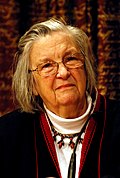Prizes
Physics
| Awardee(s) | ||||
|---|---|---|---|---|
 | Charles K. Kao (1933–2018) |
| "for groundbreaking achievements concerning the transmission of light in fibers for optical communication" | [4] |
 | Willard S. Boyle (1924–2011) | "for the invention of an imaging semiconductor circuit—the CCD sensor" | ||
 | George E. Smith (b. 1930) | |||
Chemistry
| Awardee(s) | ||||
|---|---|---|---|---|
 | Venkatraman Ramakrishnan (b. 1952) |
| "for studies of the structure and function of the ribosome" | [5] |
 | Thomas A. Steitz (1940–2018) | |||
 | Ada E. Yonath (b. 1939) | |||
Physiology or Medicine
| Awardee(s) | ||||
|---|---|---|---|---|
 | Elizabeth H. Blackburn (b. 1948) | "for the discovery of how chromosomes are protected by telomeres and the enzyme telomerase" | [6] | |
 | Carol W. Greider (b. 1961) | |||
 | Jack W. Szostak (b. 1952) | |||
Literature
| Awardee(s) | ||||
|---|---|---|---|---|
 | Herta Müller (b. 1953) | "who, with the concentration of poetry and the frankness of prose, depicts the landscape of the dispossessed" | [7] | |
Peace
| Awardee(s) | ||||
|---|---|---|---|---|
 | Barack Obama (born 1961) | "for his extraordinary efforts to strengthen international diplomacy and cooperation between peoples." | [8] | |
Economic Sciences
| Awardee(s) | ||||
|---|---|---|---|---|
 | Elinor Ostrom (1933–2012) | "for her analysis of economic governance, especially the commons" | [9] | |
 | Oliver E. Williamson (1932–2020) | "for his analysis of economic governance, especially the boundaries of the firm" | ||